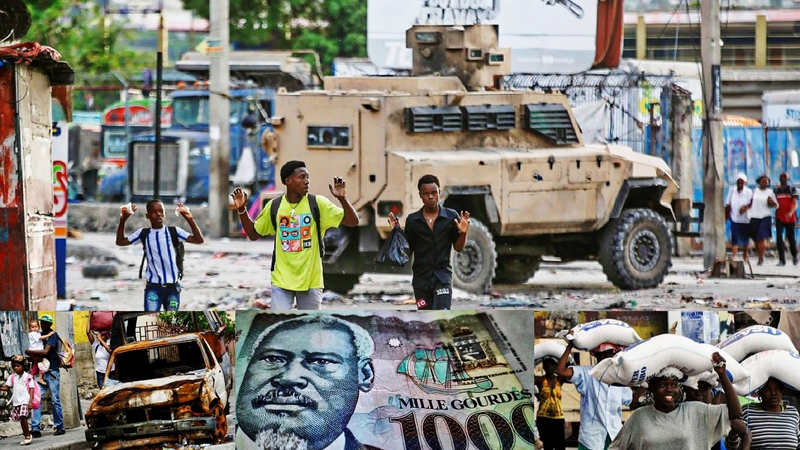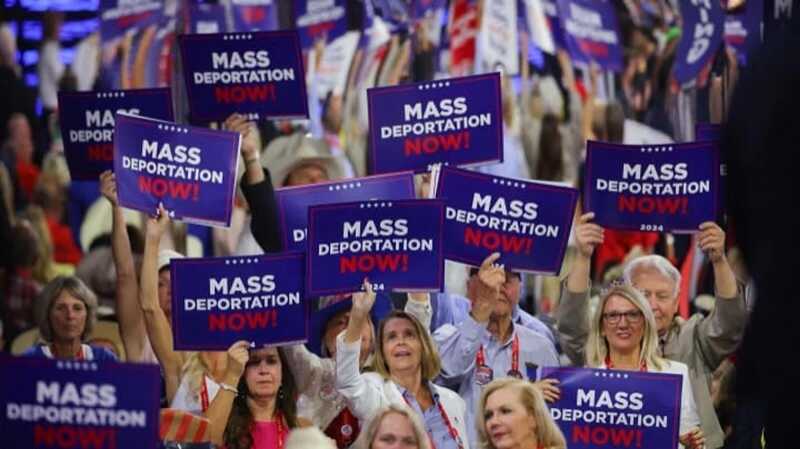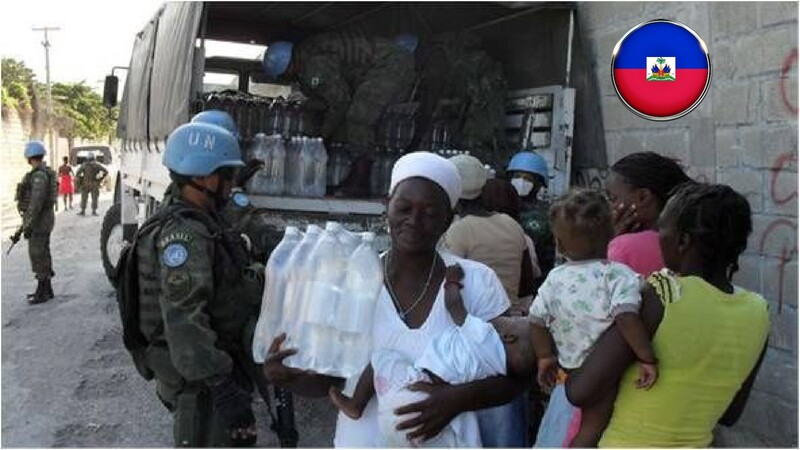 Children raise their hands to show they are not carrying any weapons during an anti gang operation in Haiti. Photo Credits: Al Mayadeen English
Children raise their hands to show they are not carrying any weapons during an anti gang operation in Haiti. Photo Credits: Al Mayadeen English
Politics, Corruption, And Business: The Complex Path To Haiti's Economic Recovery
Politics and business are deeply intertwined, shaping the trajectory of nations—for better or worse. Few places illustrate this connection more vividly than Haiti, where political instability and business challenges have created a cycle that stifles progress.
The Importance of Political Stability
Political stability is the cornerstone of a thriving economy. Both local and international investors look for governments that ensure predictable regulations, safety, and fair competition. Haiti, however, has faced significant political instability, marked by over 33 coups and attempted coups since gaining independence in 1804.
In just the last decade, the country has experienced more than 12 major political protests, often leading to roadblocks, business shutdowns, and widespread unrest. Ranked 170th out of 180 countries on the 2023 Corruption Perceptions Index, Haiti's weak governance structures remain a major barrier to progress.
The Current Political Crisis
As of 2024-2025, Haiti's political landscape remains precarious. The 2021 assassination of President Jovenel Moïse left the nation without an elected president or functioning parliament. Armed gangs have seized control of large portions of Port-au-Prince and other regions, undermining government authority.
In response, international interventions have been initiated. Most notably, a UN-approved, Kenya-led multinational security mission began in late 2023 to assist Haitian police in tackling gang violence. By early 2025, Kenyan forces and other international contingents had arrived in Haiti. While some gang activity has been curbed, critics argue that without institutional reforms and Haitian-led efforts, such interventions may offer only temporary relief. Concerns about human rights abuses by foreign troops further complicate public trust in these efforts.
The Shadow of Corruption
Following Haiti's devastating 2010 earthquake, over $13 billion in international aid was pledged. However, political infighting, corruption, and poor coordination led to significant mismanagement and delays. This obstructed business recovery, stalled infrastructure development, and discouraged private investment.
Corruption has been a persistent obstacle to Haiti's economic growth. It inflates business costs, limits market competition, and hinders entrepreneurship. For example, the infamous PetroCaribe scandal saw $2 billion in public funds misappropriated, damaging both business confidence and public trust.
Economic Challenges for Businesses
Haiti ranks 179th out of 190 countries in the 2020 Doing Business Index, reflecting excessive red tape, corruption, and regulatory barriers. Moreover, over 50% of Haiti’s GDP is informal, with businesses operating outside regulated systems to avoid bureaucracy and corruption.
Haiti’s economy is also deeply unequal, with less than 5% of the population controlling over 85% of the nation's wealth. This concentration of power and resources perpetuates economic inequality and influences political decision-making. Powerful business elites often fund political campaigns in exchange for favorable policies, tax breaks, and monopolistic control, deterring new market entrants and fueling instability.
Potential Success Stories and Persistent Problems
Certain sectors in Haiti, such as the garment industry, offer glimpses of potential. Contributing to 90% of the country’s exports and employing over 57,000 workers, this industry benefits from U.S. policies like the HOPE and HELP Acts, which provide duty-free access to American markets. However, challenges like frequent labor strikes, unreliable electricity, and political unrest continue to disrupt production and exports.
Breaking the Cycle: Reforms for Progress
For Haiti to achieve sustainable economic growth, it must address the destructive cycle of political dysfunction and business stagnation. Key reforms include:
The Importance of Political Stability
Political stability is the cornerstone of a thriving economy. Both local and international investors look for governments that ensure predictable regulations, safety, and fair competition. Haiti, however, has faced significant political instability, marked by over 33 coups and attempted coups since gaining independence in 1804.
In just the last decade, the country has experienced more than 12 major political protests, often leading to roadblocks, business shutdowns, and widespread unrest. Ranked 170th out of 180 countries on the 2023 Corruption Perceptions Index, Haiti's weak governance structures remain a major barrier to progress.
The Current Political Crisis
As of 2024-2025, Haiti's political landscape remains precarious. The 2021 assassination of President Jovenel Moïse left the nation without an elected president or functioning parliament. Armed gangs have seized control of large portions of Port-au-Prince and other regions, undermining government authority.
In response, international interventions have been initiated. Most notably, a UN-approved, Kenya-led multinational security mission began in late 2023 to assist Haitian police in tackling gang violence. By early 2025, Kenyan forces and other international contingents had arrived in Haiti. While some gang activity has been curbed, critics argue that without institutional reforms and Haitian-led efforts, such interventions may offer only temporary relief. Concerns about human rights abuses by foreign troops further complicate public trust in these efforts.
The Shadow of Corruption
Following Haiti's devastating 2010 earthquake, over $13 billion in international aid was pledged. However, political infighting, corruption, and poor coordination led to significant mismanagement and delays. This obstructed business recovery, stalled infrastructure development, and discouraged private investment.
Corruption has been a persistent obstacle to Haiti's economic growth. It inflates business costs, limits market competition, and hinders entrepreneurship. For example, the infamous PetroCaribe scandal saw $2 billion in public funds misappropriated, damaging both business confidence and public trust.
Economic Challenges for Businesses
Haiti ranks 179th out of 190 countries in the 2020 Doing Business Index, reflecting excessive red tape, corruption, and regulatory barriers. Moreover, over 50% of Haiti’s GDP is informal, with businesses operating outside regulated systems to avoid bureaucracy and corruption.
Haiti’s economy is also deeply unequal, with less than 5% of the population controlling over 85% of the nation's wealth. This concentration of power and resources perpetuates economic inequality and influences political decision-making. Powerful business elites often fund political campaigns in exchange for favorable policies, tax breaks, and monopolistic control, deterring new market entrants and fueling instability.
Potential Success Stories and Persistent Problems
Certain sectors in Haiti, such as the garment industry, offer glimpses of potential. Contributing to 90% of the country’s exports and employing over 57,000 workers, this industry benefits from U.S. policies like the HOPE and HELP Acts, which provide duty-free access to American markets. However, challenges like frequent labor strikes, unreliable electricity, and political unrest continue to disrupt production and exports.
Breaking the Cycle: Reforms for Progress
For Haiti to achieve sustainable economic growth, it must address the destructive cycle of political dysfunction and business stagnation. Key reforms include:
- Institutional Reforms Strengthen the independence of the judiciary, anti-corruption bodies, and electoral commissions to build investor trust and uphold the rule of law.
- Transparency and Accountability Enforce transparent public spending practices and hold corrupt officials accountable. This will create a fairer playing field and encourage small and medium enterprises (SMEs) to thrive.
- Inclusive Economic Policies Broaden economic participation by empowering women and youth, who make up over 60% of Haiti’s population under 25. Reducing wealth concentration fosters social stability and innovation.
- Public-Private Partnerships Encourage collaboration between the government and ethical business leaders to rebuild infrastructure, create employment opportunities, and enhance social welfare.
The Road Ahead for Haiti
Haiti stands at a crossroads, where the interdependence of politics and business shapes the nation’s future. Without transparent, stable governance, businesses will continue to falter. At the same time, without a fair and competitive business environment, political power will remain concentrated in the hands of a few.
While the deployment of Kenyan-led forces reflects international commitment to stabilizing Haiti, true long-term peace requires empowered Haitian institutions and inclusive economic policies. Breaking the cycle of dysfunction demands strong institutions, mutual trust, and collective action from the government, private sector, and citizens.
A stable political landscape could finally unlock Haiti’s full economic potential, paving the way for sustainable development and shared prosperity.
Senior Editor: Kenneth Njoroge
Financial Expert/Bsc. Commerce/CPA

